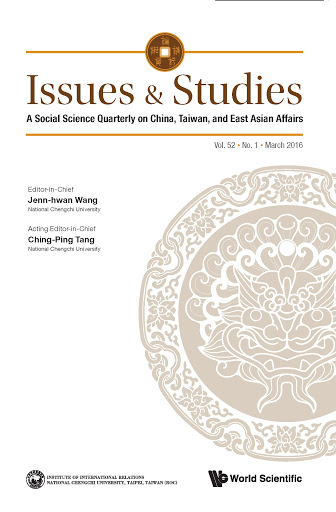Mein Artikel China’s Raw Materials Diplomacy and Governance Cycle: Toward Sustainable Mining and Resource Extraction? untersucht die chinesische Rohstoffdiplomatie und ihre Entwicklung und Strategien des letzten Jahrzehnts. Der Artikel is in Issues & Studies erschienen. Die Zeitschrift wird vom Institut für Internationale Beziehungen an der Chengchi-Universtät in Taipeh herausgegeben.
China’s Raw Materials Diplomacy and Governance Cycle: Toward Sustainable Mining and Resource Extraction?

Abstract: China’s raw materials diplomacy and unregulated purchasing of minerals in Africa and Latin America, as well as its domestic raw materials export quota, have for years been eyed with suspicion by state and private actors. Industrialized countries want to uphold and extend free market access to raw materials, but also strengthen their political accountability and sustainability. However, critics argue that in contrast, China, the world’s largest metals and minerals trading power, has taken the opposite course, ignoring social and environmental standards, reinforcing authoritarian governments, and erecting trade barriers. China is faced with several interrelated challenges in its resource diplomacy and governance. This article claims that an identifiable, chronological connection and pattern has existed between China’s aid and investment diplomacy for resources since the late 1990s, free trade agreements since the 2000s, Beijing’s resource nationalism since the 2010s, and the reform process of national and privately organized transnational governance toward sustainability in the present day. Is China socializing with emerging transnational standards on mining and resource extraction in the developing world, and if so, why? This article argues that China’s raw materials governance, including corporate governance, has entered a phase of reform to pacify the external environment and to implement the Belt and Road Initiative. In theoretical terms, China’s raw materials governance will continue to emphasize neoliberal and neo-mercantilist goals, cushioned by globalist features.
Reinhard Biedermann (2019), China’s Raw Materials Diplomacy and Governance Cycle: Toward Sustainable Mining and Resource Extraction? Issues and Studies. A Social Science Quarterly on China, Taiwan, and East Asian Affairs, Vol. 54, No. 4 (December 2018) 1840009 (31 pages)https://doi.org/10.1142/S101325111840009X
‚The European Union’s Raw Materials Diplomacy: Market Access and Development?‘

Rohstoffpolitik ist ein recht neues Politikfeld der EU and den Schnittstellen Handel, (nachhaltige) Entwicklung und Versorgungssicherheit. In 2016 ist mein Artikel zur europäischen Rohstoffdiplomatie in European Foreign Affairs Review veröffentlicht worden. Diese ist eine Antwort auf den steigenden Wettbewerb um Rohstoffe und wachsender Interventionen von Staaten in die Märkte. Insbesondere Chinas Rolle hat die Rohstoffsicherheit der europäischen Industrien ins Blickfeld rücken lassen.
Abstract: Raw materials diplomacy is the new flagship of the European Union’s (EU) international economic presence located between industry, trade, and development. Being part of the EU’s economic diplomacy, its policies are mainly derived from the EU’s new trade strategy from 2006. Set up in 2008, its main goal has been to secure undistorted and free market access for resources. It was initiated as a response to the resource boom of the last decade with rising raw materials prices and growing competition on resources by state actors and multinational state-controlled enterprises from resource-rich countries. This article explores the factors shaping this new policy and aims to answer several questions: What are its main drivers? How coherent is the EU’s raw materials diplomacy with regard to the Lisbon Treaty’s objectives on development policy? Finally, how effective is the EU’s raw materials diplomacy? The article concludes that the EU mainly wants to protect the liberal trading regime of the post-cold war order, although goals of sustainability and development are receiving more attention due to societal pressure.
Reinhard Biedermann, ‚The European Union’s Raw Materials Diplomacy: Market Access and Development?‘ (2016) 21 European Foreign Affairs Review, Issue 1, pp. 115–134
China’s rare earth sector – between domestic consolidation and global hegemony
Dieser Artikel, erschienen im International Journal of Emerging Markets, untersucht die chinesische Rohstoffpolitik und Diplomatie bezüglich Seltener Erden. Diese Rohstoff werden für moderne Technologien dringend benötigt. Von Deng Xiaoping ist der Spruch übermittelt „Der Mittlere Osten hat Öl, China hat Seltene Erden“.
Purpose

China holds a global monopoly of up to 97 percent for rare earth elements (REEs), which are indispensable for all kinds of twenty-first century high-tech applications. Since China has disrupted its exports and started discriminating between domestic and foreign demand, REEs have become a geostrategic resource. In March 2012, Japan, the USA and the European Union jointly filed a World Trade Organization dispute settlement case against China. The purpose of this paper is to elaborate why China implemented export quotas and tariffs on REEs and how the state is engaged in this sector domestically and abroad.
Design/methodology/approach
The analysis frames China as a “competition state” and connects domestic with foreign economic policy on REEs. It uses data from Chinese official documents and non-Chinese sources.
Findings
Better government control aims to consolidate the sector and lay the foundation for three other goals, namely: the establishment of integrated and innovative Chinese corporations that compete globally; the provision of incentives to attract high-tech foreign direct investment to China; and better environmental protection. China wants to climb the next step of the technological ladder to gain global economic leadership.
Practical implications
Global environmental protection in mining is eased. However, non-Chinese market players can only take advantage of new business opportunities when the prices remain high. Since REEs are of strategic importance, rising political interference and raw materials diplomacy will continue to distort markets and price building.
Originality/value
The paper connects domestic reregulation of China’s rare earth sector with foreign policy goals (or “going in” and “going out”) using the competition state approach.
Peter Biedermann, R. (2014), „China’s rare earth sector – between domestic consolidation and global hegemony“, International Journal of Emerging Markets, Vol. 9 No. 2, pp. 276-293. https://doi.org/10.1108/IJoEM-05-2013-0080
